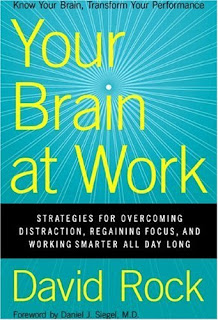 A great book I just finished reading is David Rock's Your Brain at Work: Strategies for Overcoming Distraction, Regaining Focus, and Working Smarter All Day Long.
A great book I just finished reading is David Rock's Your Brain at Work: Strategies for Overcoming Distraction, Regaining Focus, and Working Smarter All Day Long.Here are my notes:
1. Problems and Decisions
- The prefrontal cortex is the part of the brain which is responsble for high-level thinking and decision-making
- Metaphor: the "stage" (of a theater)
- Prioritizing is an energy-hungry yet crucicial task
- Using visuals is often useful
- Get things out of your head (e.g. to paper)
- Schedule most attention-rich tasks to time slots with a fresh mind
- Simplify, group big problems/tasks into chunks
- Focus on only one conscious task at a time
- Multitask only with embedded, automated routines
- Stop external distractions
- Veto internal distractions early on
- Find zone of peak performance: right amount of stress
- to increase stress: small does of fear (e.g. visuals), novelty, new perspective, humor
- to decrease stress: activate other brain regions: walk, relax, music
- To gain insights e.g. for creative tasks: take pressure off. do something fun, think of big picture instead of details.
2. Staying cool under pressure
- Emotions are controlled by the limbic system
- The limbic system connects emotions with thoughts, objects, people, and events
- Over-arousal reduces performance
- Once emotion kicks in, don't supress but apply
- labelling (give names to emotions)
- reappraisal (reframe the situation)
- Find ways to create choice and perceived autonomy
- Four ways to practice reappraisal:
- reinterpret (look from different angle, give situation a different meaning)
- reorder values (e.g. value working with people higher than in the past)
- normalze (look for an explanation)
- reposition perspective (look through eyes of other person)
- Set lower expectations and exceed them. Will trick brain into "reward" mode.
- The one thing that makes people happy is the quality and quantity of their social connections
- Social connections are actually a primary need, such as food and water at times
- Healthy collaboration with others require safe connections.
- Anytime you meet someone new, make an effort to connect on a human level as early as possible.
- In the absence of positive cues, people are classed as foes and not friends.
- A sense of fairness can be a primary reward for the brain (and unfairness a thread).
- Increasing perceived fairness can make you very happy, e.g. volunteer work, donating money
- Status is a significant driver of human behavior. Sense of status going up activates reward circuits in brain. Similar, sense of status going down is perceived as threat.
- Trick your own brain into "status rewards" by playing against yourself. E.g. improve your golf handicap, bet against yourself.
- Reduce status threats by admitting mistakes, sharing humanity.
- 5 major social domains = SCARF: Status, Certainty, Autonomy, Relatedness, Fairness
4. Change
- Most people don't like "feedback" conversations.
- Instead of suggesting people what to do, bring people to their own insights. Help them think about their thinking process.
- Change in the brain is possible and can be permanent.
- Focused attention is a good way to change the brain.
- Move people to "toward" state and to focus on solutions instead of problems. Repeat.